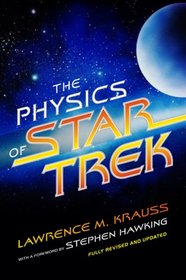Helpful Score: 3
Ok, at first glance I was excited to be able to read this book. At last! Someone with credentials will explain how the Star Trek 'toys' COULD work!
Alas, this book is, in my opinion, a standard physics lesson, with some loose references to Star Trek thrown in. Interesting in it's own right, but not the book I thought it would be, in fact, Krauss spends a lot of the book telling us why the things in Star Trek CANNOT work.
Mr. Krauss has apparently not heard of the Science Fiction adage, "Willing Suspension of Disbelief'.
I really do not care if Star Trek's goodies can work in our current understanding of physics. That science is constantly changing - at one time everybody who was anybody thought the earth, the sun, the moon and the stars were all contained within crystalline spheres and that the earth was the center of all this and everything revolved around it - and so who is to say that in the next 200-300 years our understanding of physics won't have changed enough to allow phasers, transporters and all the rest to exist.
Mr. Krauss' main argument for the impossibility of Warp Drive was the power requirement. Again, who is to say that in 200-300 years, we won't have found a better way to produce power to achieve warp drive.
If you're looking for a physics lesson, this is your book. Otherwise... pass.
Alas, this book is, in my opinion, a standard physics lesson, with some loose references to Star Trek thrown in. Interesting in it's own right, but not the book I thought it would be, in fact, Krauss spends a lot of the book telling us why the things in Star Trek CANNOT work.
Mr. Krauss has apparently not heard of the Science Fiction adage, "Willing Suspension of Disbelief'.
I really do not care if Star Trek's goodies can work in our current understanding of physics. That science is constantly changing - at one time everybody who was anybody thought the earth, the sun, the moon and the stars were all contained within crystalline spheres and that the earth was the center of all this and everything revolved around it - and so who is to say that in the next 200-300 years our understanding of physics won't have changed enough to allow phasers, transporters and all the rest to exist.
Mr. Krauss' main argument for the impossibility of Warp Drive was the power requirement. Again, who is to say that in 200-300 years, we won't have found a better way to produce power to achieve warp drive.
If you're looking for a physics lesson, this is your book. Otherwise... pass.





